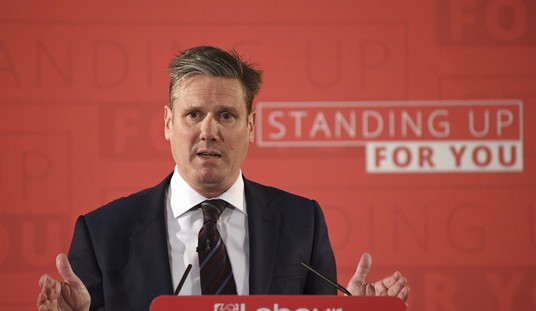A federal grand jury working with Robert Mueller’s special counsel probe has indicted 13 Russians and three Russia-based organizations on multiple counts of fraud, alleging a conspiracy to interfere with the 2016 US elections. The allegations make a compelling case for the seriousness of the Russian propaganda operation. However, a close reading of the indictment also makes an argument that Mueller might not have a case for collusion — yet, anyway:
BREAKING: Robert Mueller indicts 13 Russians for election meddling pic.twitter.com/bhwaCegSCW
— MSNBC (@MSNBC) February 16, 2018
The indictment accuses Yevgeny Prigozhin, a crony of Vladimir Putin, of running the operation — an accusation that will no doubt have diplomatic consequences in both directions. The Russians spent 2014 and 2015 setting up front organizations and researching American voters and the candidates, according to the indictment. By 2016, they had the interference effort well under way. But what was their motivation? They wanted to support Donald Trump — but also Bernie Sanders:

In fact, when reading through the indictment, it becomes clear that the conspiracy cared more about Hillary Clinton than either Trump or Bernie Sanders. Don’t forget that the overwhelming conventional wisdom — right down to Election Night — was that Hillary would win the presidency. The Russian interference campaign appears intended to rattle confidence in that result, as well as stoke a lot of conspiratorial thinking in the meantime.
Their paid advertising tends to support that conclusion, too. The defendants set up fake bank accounts — a very indictable action — to pay for social-media advertisements. Only three of these are endorsements for Trump without any other mention of Hillary, all after Sanders had been all but eliminated from the nomination:

Between the conventions and the election, all of their activities were aimed at either supporting Trump, except in one case where they supported Jill Stein, or opposing Hillary. After the election, however, they began conducting attacks on both Trump and Hillary, including arranging competing rallies on the same day in two different cities:

If nothing else, this makes the purpose of the operation clear — to stoke mistrust in the election and to damage the winner. Had Trump been considered a favorite to win, the Russian operation may have targeted him more before the election, but they clearly didn’t hesitate to attack him after his win.
The indictment makes other representations as well, alleging that the social-media efforts ended up engaging a significant number of Americans. What it doesn’t allege is that this had an impact on voter choice, and there is no mention at all of penetrating voting systems to perpetrate direct voter fraud. That doesn’t negate the hostile actions taken by a foreign power, nor does it make the identity and banking theft less illegal, but neither does it present an argument that the election itself was not credible or reliable.
Also absent from this indictment is any indication at all of connections to the Trump campaign, or any other candidate or party campaign, for that matter. All of the contacts in this indictment between defendants and other US persons are depicted as unwitting, part of the fraud perpetrated by the defendants. The DoJ press release makes specific note of this:
To hide the Russian origin of their activities, the defendants allegedly purchased space on computer servers located within the United States in order to set up a virtual private network. The defendants allegedly used that infrastructure to establish hundreds of accounts on social media networks such as Facebook, Instagram, and Twitter, making it appear that the accounts were controlled by persons within the United States. They used stolen or fictitious American identities, fraudulent bank accounts, and false identification documents. The defendants posed as politically and socially active Americans, advocating for and against particular political candidates. They established social media pages and groups to communicate with unwitting Americans. They also purchased political advertisements on social media.
The Russians also recruited and paid real Americans to engage in political activities, promote political campaigns, and stage political rallies. The defendants and their co-conspirators pretended to be grassroots activists. According to the indictment, the Americans did not know that they were communicating with Russians.
There may be one exception to this, but it’s not on the propaganda operations. Mueller’s office also announced the indictment of a Richard Pinedo of California for wire fraud relating to the sale of bank account numbers to foreign nationals. He’s already pled guilty to the charge. The indictment doesn’t specifically say it relates to the Russian operations, but it’s probably safe to assume it. It also contains no mention at all of legitimate US political or campaign operations.
It may be that Mueller’s holding off on other allegations until he nails down evidence of collusion, but then why release this indictment at all? It’s not like the defendants will skip the country; none of them are here now as it is, and they won’t ever get extradited unless they’re stupid enough to travel to a country willing to send them our way. If Mueller had evidence of collusion, he should have waited to release this indictment until he could make the full case, demonstrating where Trump or others engaged with Prigozhin. Instead, it looks like this was just a Merry Pranksters operation run out of Russia, or perhaps better put, Scary Pranksters.
Let’s also recall what the specific theory of collusion was. The allegation was that the Trump campaign worked with the Russians to hack the DNC and expose their bad treatment of Sanders, along with other embarrassments. This indictment doesn’t mention the DNC hack at all. It’s still possible that Mueller’s working that on a separate track, but the public perception of collusion has morphed into the Trump campaign coordinating with the propaganda operation. This indictment sure seems to indicate that there’s no support for that theory of collusion, either.
At this point, it seems that the only crimes to come out of the Mueller probe will either be unrelated to its original mission or process crimes that have nothing to do with so-called collusion. This indictment certainly seems to tell a full and self-contained story.
Update: Allahpundit will have more, but let me add one more observation. This indictment shows that the issue of Russian interference into US elections was not and is not a “nothingburger.” The Russians apparently threw a ton of resources into this, and it didn’t just result in propaganda, but also wire fraud, bank fraud, and identity theft, among other things. It also doesn’t prove that “collusion” is a nothingburger, but it doesn’t give any indication that there’s anything to it either.








Join the conversation as a VIP Member